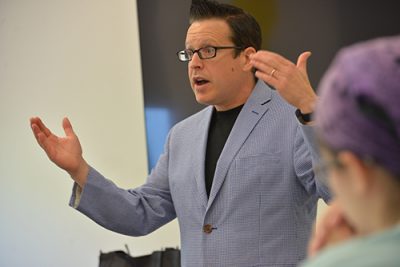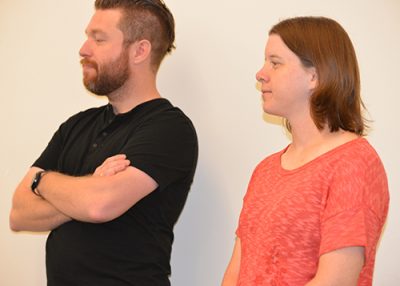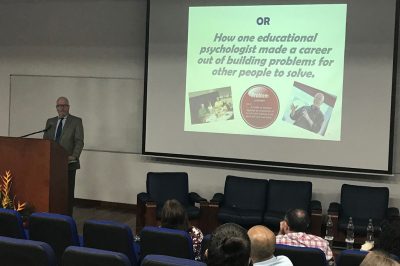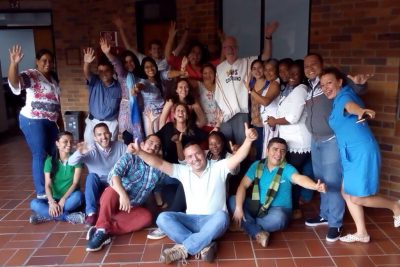Hartford Courant (Neag School alumnus David Erwin is profiled regarding his retirement as superintendent of Berlin Public Schools)
UConn Insider: Chris Dailey Sharing in Geno Auriemma’s Milestone
Hartford Courant (Neag School alumna and UConn women’s basketball assistant coach Chris Dailey is featured regarding 1,000th win)
Response: Policymakers Need to Know There Are No “Easy Fixes” in Education
Education Week (Neag School faculty members Rachael Gabriel and Sarah Woulfin are interviewed about their guide for literacy teachers and leaders)
Massachusetts is Like Connecticut, But Does a Better Job Educating the Poor
CT Mirror (Neag School’s Jennie Weiner is interviewed about education reform in Connecticut)
UConn Taps Creativity Expert Beghetto to Lead Innovation House

UConn’s Office of First Year Programs and Learning Communities has tapped internationally recognized creativity expert and Neag School educational psychology professor Ronald Beghetto as the faculty director of UConn’s Innovation House. Beghetto, a 2015 UConn faculty of the year awardee who focuses his research on creative thought and action in educational settings, began his new director role this past fall.
“This opportunity dovetailed really nicely with the things I’d been working on in my own research and work,” says Beghetto, who joined the Neag School from the University of Oregon in 2014. “It provides an opportunity for me to put into practice some of the work that I’ve been thinking about in how to help young people respond productively to uncertainty, and develop ideas for how they might address problems and complex challenges, and then actually do something about it.”
“I want the students to have an experience rapidly prototyping solutions, taking something from an idea into an actual product, and doing that in a fun and meaningful way.”
— Professor Ronald Beghetto,
Faculty Director, Innovation House
According to David Ouimette, executive director of the Office of First Year Programs and Learning Communities, Innovation House provides a space where undergraduate students from any major can come together to think about and share ideas, and learn how to put ideas into action with the potential for creating real change.
Beghetto is a particularly good fit for the faculty director role, says Ouimette, given that his “research and accomplishments fall directly in line with what we are trying to accomplish in Innovation House.” Beghetto is teaching first-semester students about the design process and leading them not only to fabricate solutions to problems using the Learning Community Innovation Zone makerspace, a key feature in the Peter J. Werth Residence Tower where the Innovation House is located, but also teaching them to pitch their ideas to various audiences.
“The goal is for students to foster a mindset of innovation and creativity starting in the first year that they take into the rest of their academic journey at UConn and beyond,” says Ouimette.
Two other Neag School faculty members also serve as UConn Learning Community directors; Erik Hines, assistant professor of school counseling, has led ScHOLA²RS House since Fall 2016, and Jaci VanHeest, associate professor of educational psychology, director of the Public Health House since 2010, remains the longest-running learning community faculty director at the University.
With ScHOLA2RS House and the Innovation House students sharing a floor in NextGen Hall, Beghetto foresees many opportunities for collaboration between these as well as other learning communities at UConn, since innovation is “something that any of the houses could interact with.”
The Year Ahead

Over the course of the academic year, Innovation House students will be carrying out so-called legacy projects that involve identifying a problem, designing the solution, working with external partners, and implementing solutions.
“I want the students to have an experience rapidly prototyping solutions, taking something from an idea into an actual product, and doing that in a fun and meaningful way,” says Beghetto. “They’re going to be building that out, partnering with community organizations from around UConn, and then actually implementing a solution to a problem.”
At the end of the year, there will be an exhibition night during which the students will share their progress.
“Some of the projects may not turn out,” says Beghetto. “But what will definitely happen is that they will have learned something from the experience.” It is precisely this kind of learning experience, he says, that students can then take with them not only into whatever field of study they want to pursue, but also into daily life.
“The top priority is to bring attention to the amazing students we bring to UConn each year and help build their capacity to fully engage in our community and beyond,” says Ouimette. “Learning Communities provide a setting to develop a community of students who have a sense of belonging and purpose, and who feel challenged and supported as they enter the UConn community.”
Learn more about UConn’s Learning Community Program at lc.uconn.edu. For more information about the Innovation House, contact Ronald Beghetto at ronald.beghetto@uconn.edu. Watch a video about the Learning Community Kickoff, featuring fellow Neag School faculty member Jaci VanHeest.
Program Allows High School Students to Pursue Academic Interests at UConn
The Daily Campus (The Jack Kent Cooke Foundation has funded $300K though the Neag School to support mentor education)
Neag School Receives $300K Award to Support Mentor Education
Hartford Courant (Neag School’s Renzulli Center for Creativity, Gifted Education, and Talent Development has received a $300K award from the Jack Kent Cooke Foundation for mentor education)
New Principal Named at Metacomet School
Hartford Courant (Neag School alumna Jocelyn Poglitsch was named principal of Metacomet School in Bloomfield)
Scott Brown Provides Training in Colombia as Fulbright Specialist

Since 2001, the Fulbright Specialist Program has been pairing a selection of top U.S. faculty experts and other professionals from a variety of disciplines with foreign host institutions for anywhere between two and six weeks to serve as consultants — sharing their knowledge and skills, and taking part in activities that support the host institution’s priorities and goals — while being immersed in other cultures.
Board of Trustees Distinguished Professor of Educational Psychology Scott Brown, who is certified as a Fulbright Specialist, accepted an assignment that sent him this past month to Pontificia Universidad Javeriana (Pontifical Xavierian University) in Cali, Colombia — one of the oldest universities in Colombia, founded in 1623.
Over the course of his two-week appointment, Brown taught two cohorts of Universidad Javeriana master’s degree students the principles of problem-based learning as part of a newly developed graduate degree program in psychology offered there. One of Brown’s former Neag School educational psychology doctoral students, Tatiana Rojas Ospina ’14 Ph.D., developed and directs the new program. Herself a 2010 Fulbright Scholar, Ospina now serves as a professor of psychology at Universidad Javeriana.
Brown also delivered an address on problem-based learning to the Universidad Javeriana’s president, dean of social science, and about 50 professors, in addition to taking part in a panel discussion on teaching and learning with six of the university’s faculty members.

“It has been a great experience, and it will certainly enhance my teaching, appreciation for diversity, and a new culture,” Brown says. “It has also enhanced some opportunities for research on GlobalEd 2 here in Colombia.”
GlobalEd 2 is a computerized, problem-based social studies game that gives middle-school students an opportunity to learn about geography, government, human rights, the environment, and other real-world issues by assigning classrooms to work remotely with other classrooms via online simulations, email, and web-based channels on negotiating international agreements on solutions to water resources, food security, climate change, and other socio-scientific topics. Brown is co-principal investigator on several GlobalEd 2 projects. This past year, he and co-principal investigator Kimberly Lawless ’94 MA, ’96 Ph.D., associate dean of research at University of Illinois at Chicago, received a three-year, $1.2 million grant in support of a project focused on continuing to refine the GlobalEd 2 Project on STEM literacy, which originally began nearly a decade ago with funding from the U.S. Department of Education’s Institute of Education Sciences (IES).
Related Stories:
UConn Appoints University of Georgia Administrator as Provost
Hartford Courant (Newly appointed Provost Craig H. Kennedy will have a Neag School faculty appointment in the Department of Educational Psychology)
